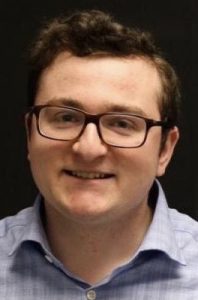 Recent cybersecurity master's graduate Jonathan Deutsch
Recent cybersecurity master's graduate Jonathan DeutschJonathan Deutsch, a graduate of the Katz School's M.S. in Cybersecurity program and a technology professional, was drawn to Katz not just to master cybertechnology but for the soft skills -- to learn how to lead people and teams, to teach others how to protect themselves from cybersecurity threats, and to empower others to take their electronic destiny into their own hands.
"The hard skills you can always learn, but the soft skills and how you communicate them are most important," he said, "and that's where the Katz School program was exceptional."
Jonathan said one of the most valuable things about the master's program is that the professors are practitioners and therefore keenly aware of what the current cybersecurity environment is like.
"They bring real-world experience to current events and issues in the profession," he said. He was particularly inspired by Alexsandr Zhuk's leadership course that draws a distinction between managers and leaders. "People are more likely to follow and do the right thing when they want to do it rather than when they have to do it," he said.
In January, he became Compliance Lead for Axoni, a New York-based technology firm that specializes in blockchain infrastructure, because of the relationships he had forged with Katz cybersecurity faculty. "The level of care that Professor Zhuk and other professors showed was phenomenal," he said. "They are genuinely interested in students and are there for you. They are very passionate about their area of expertise and want their students to succeed."
After graduation, Jonathan was accepted into another master's program at Columbia University. He also obtained the coveted CISSP certification, which is granted by the International Information System Security Certification Consortium, also known as (ISC)². CISSP is well-recognized and globally trusted, and it enables students to perform various security job functions and pursue an advanced IT security career.
In the Katz School master’s program, students gain cybersecurity know-how in systems architecture, operating systems, applications, endpoints, securing data, networking, cloud security, and software development. They analyze threat landscapes and security frameworks, as well as legal, compliance and audit frameworks. They develop internal and external communication strategies to promote a cybersecurity culture. And they prepare for industry certifications, including CISSP, CISM, CRISC and CEH.
Demand for cybersecurity professionals is on the rise, according to the U.S. Bureau of Labor Statistics. The bureau reports that the industry will experience job growth of 31% between now and 2029, which is a much faster rate than most other industries. The median salary of an information security analyst, for example, was $103,590 in 2020.
In his free time, Jonathan is a volunteer mentor for emerging cybersecurity students with Cyber Ladies NYC, founded by Katz School cybersecurity instructor Sivan Tehila Alus, and works with nonprofit and educational organizations to help design secure technology solutions to help further their mission. He said he's passionate about how cybersecurity relates to the role human nature plays when defending digital assets.
"We're dealing not only with the technical reality of a security breach, for example, but also the social and psychological reality," he said. "The Katz program not only explored that reality but gave us the vocabulary to make it accessible to anyone in the company."
